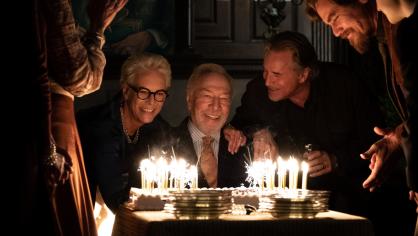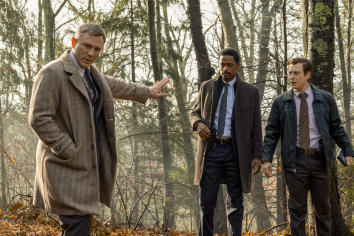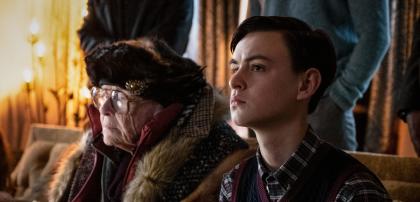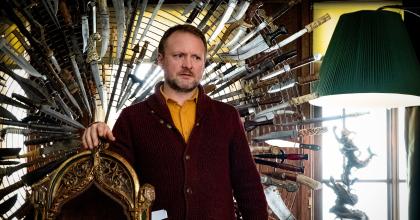Rian Johnson Gave Daniel Craig The Chance To “Cut Loose And Play” In Agatha Christie Homage ‘Knives Out’

Click here to read the full article.
Has Rian Johnson birthed a new franchise with Knives Out? With a $40+ million opening weekend gross over Thanksgiving, it may not have reached the dizzying highs of his last movie, 2017’s Star Wars: Episode VIII – The Last Jedi, but Knives Out is still a rare beast in 2019; an original murder mystery tale that is effortlessly drawing in audiences. Inspired by classic Agatha Christie whodunits, Johnson pays homage to the genre’s legacy while at the same time dragging it into the modern era. It wouldn’t be hard to imagine future adventures for his central detective, Daniel Craig’s Benoit Blanc.
DEADLINE: A weak whodunit betrays its artifice on a second viewing, where audiences are looking out for the film’s misdirection during the mystery. Knives Out is quite different.
More from Deadline
RIAN JOHNSON: Oh, thank God [laughs].
DEADLINE: In this case, you’re just left with a better understanding of all the little clues you drop, and the mechanics by which you weaved between them.
JOHNSON: We built little things in there, yeah. I think it’s important, even on the first viewing—even if there are things that you’re not going to pick up until you see it again—that you, as an audience, are so tuned into it. You’re going to be picking up so much stuff, even if you don’t know its relevance yet.

And just as a fan of whodunits, I know that that big dénouement scene at the end, where you do your reveals, is only satisfying if it feels like you’re connecting dots that you recognize. It’s the recognition scene, and that’s where all the satisfaction comes from. So, planting those very clearly, that’s fun, and there are some tiny things that I’m very proud of that you probably will only catch on your second viewing.
DEADLINE: What’s the trick to crafting a story of this sort, where you have to include important clues so that the audience doesn’t feel cheated out of any revelation, but equally, you don’t want them to spot them too early?
JOHNSON: Well, my trick was to try to openly say to the audience, “Don’t worry about figuring it out,” fairly early in the film. To do this narrative gambit where we basically tell the audience, “This isn’t about figuring out what happens; we’re going to show you what happened. This is a roller coaster ride, not a crossword puzzle.” That was kind of my trick.
But also, I hope that, as opposed to leaning into the head game of the puzzle, you’re leaning into the more Hitchcock-based, “Here’s a character that you care about; they’re in peril.” That’s a journey that will hopefully engage you when you see it, and that’s the actual engine of the movie, more so than figuring out the whodunit.
Then, for me, the fact that all the whodunit stuff tracks and works and is satisfying, that’s kind of gravy, I guess. The movie working first and foremost as a movie was the important thing.
DEADLINE: Where did your writing process on Knives Out begin?
JOHNSON: I start in a very abstract place, in terms of structure and genre. This is a genre that I adore, but I do think that the one weakness of it is that it can tend to be a bunch of clue-gathering, leading to one big surprise. So, the initial thought was as simple as, can you put in the engine of a Hitchcock thriller, and still have all the essential pleasures of a whodunit? Can you have your cake and eat it, too?
Figuring out a shape for how that would work was kind of the first step, but very much in the abstract. Then, only when I had that, I started zooming in and figuring out, okay, I craft the characters to the needs of the story. So, that means I need a sympathetic main character, and that would make sense of her relation to the family. Then, that means the killer, I want to do this kind of thing with. So, I started zooming in from there, basically.
DEADLINE: Does that kind of abstract thinking end up defining the personalities you’d be examining, as well?
JOHNSON: Very much so. I never start with character. I start with structure and story and theme, and kind of build my skeleton. That way, I can craft my characters to the specific needs of the story. There are filmmakers for whom I’m sure that’s anathema, but to me, that’s just the way I’ve always done it. It’s the only way I can approach it, and especially with something like this that has to be such a Swiss watch.
DEADLINE: I suppose if you did things the opposite way, you might end up boxing yourself in…
JOHNSON: Or just going nuts [laughs]. I think that also, I’m not smart enough to do it the other way around. I would get lost in the weeds too quickly. I need a map. Because I wanted the movie to be satisfying at the end for an audience, with that clean, bold line from beginning to end.
I know if I had dived in first to the particulars of the crime or the whodunit, or what the gimmick was of how they did it, I would lose that really quickly. To me, what’s satisfying about a good ending is how it resonates with the very beginning, and how that theme has been hit at every single point along the way. And I’m not smart enough to track that if I don’t have a roadmap to start with.
DEADLINE: It can be an unforgiving genre.
JOHNSON: Yeah. It can expose storytelling flaws, and also logic flaws, very quickly. Murder by Death, it’s not like a great whodunit—it’s a pastiche of whodunits. I love it, though, dearly. There’s a fantastic scene at the end where Truman Capote’s character has gathered all the world’s greatest detectives. So, you have Peter Falk channeling Philip Marlowe, you have David Niven and Maggie Smith playing Dick and Dora. They’re all under one roof, and he basically leads them on a wild goose chase—and then, at the end, completely berates them for their sins against readers, and lays out anything that you’ve ever found frustrating about whodunits. Introducing characters you’d never heard of at the least minute, withholding vital information, it can be frustrating. But then, if it’s done well, there’s nothing quite like the pleasure of good whodunit.

Agatha Christie… next to the Bible, she’s the next bestseller. So, it’s weird to say she’s underrated, but I feel like she doesn’t get enough appreciation for—beyond just her plots, or the gimmicks of her plots, and how good her books are—the character work in them, and the way that they build. They build a story beyond the puzzle work in them. And ultimately, it has to be that.
That thing I was talking about on Knives Out, though, where I tried to put another engine into the car… All of her best books, in some form or another, do that. And Then There Were None is basically a proto-slasher movie; it’s a horror movie, essentially. The ABC Murders is a serial killer movie, and she does a very similar thing where, up at the first scene in it, you meet the serial killer, and you see them planning the next thing—and those are the mechanics of it, until they aren’t. She was really adept at that.
DEADLINE: When you started thinking about Knives Out, were you reading or watching other whodunits? Did you go down that rabbit hole?
JOHNSON: Not really, because I have done that with whodunits. I’ve just been reading them since I was a kid, it’s something that I always keep coming back to. I find it not useful to do research and read specific books. To me, it’s more useful to blur my vision, and to think, in more general terms, about what I love about the genre—to almost create an idealized vision of what works about the genre for me, and then take that and set that as my goalpost. Otherwise, there might be the danger of just creating a patchwork of stuff from other sources. For me, it’s much more about getting at the heart of what about this genre really resonates for me.
DEADLINE: It feels like you’ve always been building on something in your movies—that they’re crafted with an awareness of what has come before.
JOHNSON: Well, I hope that comes from the love of the thing that I’m working on, and just a deep love of the genre. If I’m working with a genre, it’s not because I feel like, “How can we take this dusty thing and turn it on its head?” If I’m working with a genre, it’s because that genre works for me, and I’m trying to use what’s powerful about the genre to my own ends. I’m trying to harness what’s great about it and what works about it, and that means trying to deeply understand it—and also, mostly just recognizing, on a very personal level, what it is I connect with, in trying to harness that.
DEADLINE: You also really modernized the whodunit here, and brought it out of the Christie era while still acknowledging that rich legacy.
JOHNSON: The thing is though, that’s what Christie did. It’s funny, it all goes back. I think because we so often see whodunits through the lens of them being period films, we tend to think of her books as somehow being timeless. And they weren’t. She was very much writing to society at the moment she was writing. She was engaging with her contemporary society.

The idea of not just putting a modern skin on an old form, but really applying that form to today and plugging it into 2019—the way that she did back then, doing that now—that means doing characters that could only exist today. That seemed exciting, and then applying the way that mysteries have traditionally been very good conduits for talking about class, and applying that to America in 2019, seemed fun.
DEADLINE: How much of the film’s commentary came from your experience of social media over the last couple of years?
JOHNSON: Some of the immediate political stuff obviously sprang up out of the last couple of years, but weirdly, the basic bones of what it’s about—who Marta is as a character, and how that applies to the family—I’ve had for years and years, right before the election. That’s always been in the bones of it.
And to me, it’s less about talking about politics. It’s more just generally talking about the basic human foible of self-mythologizing, in a way that allows you to kind of close the castle gate. That, to me, and seeing that reflected in a broad spectrum of characters across the political spectrum, is much more interesting.
I also wanted to examine a broad spectrum, and if I’m going to dig into the conservative, that means I’m also going to dig into the liberal. It’s not as if the movie sympathizes with both sides of the issue that it’s talking about—it has a very definite perspective on it. But as a Hollywood liberal, recognizing human failings in myself and self-indicting, that’s incredibly important, I think.
DEADLINE: What was your timeline for pulling this together?
JOHNSON: I mean, I had wanted to do a whodunit forever. Then, about 10 years ago, I had the basic idea for this, the shape, and penned the concept of it. Then, I’ve just kind of been chewing on it ever since. But I sat down to write it in January of 2018, right after The Last Jedi came out, and I wrote it very fast. I wrote it in about six months, and then we had wrapped the movie by Christmas. It came together really, really quickly, mostly because Daniel [Craig] signed up for it and had a very brief window that he was available before he went into Bond world.
DEADLINE: Did you have specific actors in mind while writing?
JOHNSON: No, not really. I’ve kind of learned not to do that because, inevitably, they won’t be available, and you’ll be sad. So, I just write the characters as a blank slate, and then sit down with Mary Vernieu, my casting director, and figure out who’s available, and start making plays.
DEADLINE: You started with Daniel.
JOHNSON: Yeah. Him signing up is the reason we were able to make the movie. Besides being a movie star, he’s also a fantastic actor who is really well respected, so I think he served to attract higher caliber talent to the project.
DEADLINE: It might seem like a bit of a leap to imagine Craig playing a Southern detective like Benoit Blanc.
JOHNSON: That’s the thing. I mean, he’s great as Bond. I had seen him in other things over the years. Obviously, it was Logan Lucky recently, where you see he’s willing to kind of have fun and go a little wackier. I’d seen him on the stage.
I just knew that he’s a great actor, and also, I got the sense that he was really looking forward to the opportunity to have some fun. So that, much more than the idea of somehow playing off of how the public perceives him, was the motivation. I just got the sense that he was ready to really cut loose and play with this one, and he did.
DEADLINE: How did you come to Ana de Armas for the role of Marta?
JOHNSON: I had seen her in Blade Runner 2049, but I wasn’t really familiar with her work. It was Mary who brought her to my attention and said, “This girl is really something special, you have to look at her.” I looked at her work and I could tell that she was really good, but I googled Ana and saw glamour shots of her, and I was just like, “No, she’s totally wrong for it.” Then, I met with her and read her, and she was so right. Besides being just an incredibly skilled actor, she has that indefinable thing with her eyes. She’s got that Audrey Hepburn-type thing, where her eyes just bring you in, and you’re instantly on her side, and that’s what we needed for the character. It was perfect.
DEADLINE: Marta’s incredibly intelligent and, above all, kindhearted, in contrast to almost everyone who surrounds her.
JOHNSON: She had to bring a strength to it, so that the character didn’t just feel like a doe-eyed sucker who kind of flops through this thing. That would have been frustrating for people.
When I met with Ana, the first thing that she talked about was how the character needed to be strong, and there were lots of moments during the course of it where she brought that. There’s moments that could have been played one way or the other, and she would always err on the side of, “What’s the stronger choice for Marta? What is the more self-determined, strong choice in this moment?”
And this is beyond just the notion of a “strong female character”. This is actually something that is specifically, very important to the role for those reasons. Because of her good heart, and because of her path through the movie, that’s absolutely vital to keeping the audience on her side.
DEADLINE: How do you establish the family dynamic between the Thrombeys without making that the focus of the story? You don’t have a lot of time to build the complexity of that while you’re focusing on your core narrative.
JOHNSON: You know, I grew up in a big family, and my family is nothing like this family. My family is lovely, and I love them. I have great relationships with them, but I did grow up in a big family, and anyone who did understands family politics, and the strong undercurrents. All of that stuff that’s kind of the heart of drama, that’s in any big family. I definitely drew from that, and they all clicked into it.
We didn’t do a ton of writing pages of backstory. The actors didn’t need much to click into it. I think everyone kind of got it pretty quickly. It’s a testament to the skill of these actors that it’s a big cast, and there’s a lot of real estate to cover in the script, and the truth is, these actors do quite a lot, sometimes, with not much screen time. It takes a really great actor to be able to create that impression that you’re seeing a full character, when you only really have a scene or two to get that across.
DEADLINE: Where did you find that house?
JOHNSON: The house is in Massachusetts. It’s a real, privately owned house and we shot inside, outside of it. My producer, Ram Bergman, because he’s a good producer, started scouting for houses before I had finished the script. Once he knew that was a centerpiece, we started looking, and once we saw that house, it was like, “Oh, that’s where we’re going.” That’s the reason we went to Massachusetts.
DEADLINE: Did you have to adjust the script to the layout of the house you chose?
JOHNSON: Not really. There were a couple of specific things, and those, we actually did build. So, the upstairs hallway with the trick window, that was a build. And then [Harlan Thrombey’s] attic office was a build. Just because it was such a tiny, specific space, we needed to be able to fly walls out to shoot in there. That’s kind of the only specific geography that we had to work out. Other than that, the house kind of worked.
DEADLINE: Designing the interiors of your mystery writer’s mansion must have been a joy.
JOHNSON: It was fun. One of my favorite films is the 1970s version of Sleuth, with Laurence Olivier and Michael Caine. That movie is also obviously centered on a mystery writer, and largely takes place inside the mansion, but it’s like the inside of his brain. So, I gave David Crank, our production designer, and David Schlesinger, our set decorator, that reference, and they just ran with it. They completely scoured Massachusetts for oddities, strange curios, automatons and artwork, and it’s such a rich, beautiful tapestry they made, which to me was a joy. I just loved being on set. I would just wander around, looking at the shelves, and seeing all the treasures they had gathered up.
DEADLINE: Did you document all of that stuff?
JOHNSON: Yeah. We have folders of photos of all this stuff, and a lot of it is still sitting in the warehouse somewhere.

So someday, if I ever want to just deck the house out… We’ll see if [my wife] Karina would kill me. We’d have another murder on our hands.
DEADLINE: Surely you took the wheel of knives?
JOHNSON: I really wanted to, but half of those knives were rentals. It’s funny. The big, industrial barbecue grate and all the knives on it, half of them were antique knives that we rented. Priceless pieces.
DEADLINE: The great tragedy of a beautifully designed film is that the better the design is, the less of it you actually notice. But the design of Knives Out has its effect.
JOHNSON: Yeah, it absolutely does. I can say, on the page—and this was something that we had to deal with—people would read it and say, “Well, this feels like a small movie, because it’s all just taking place in the rooms.” I mean, it’s a testament to Crank and his team that it doesn’t. It should, but the fact that they made that interior so rich, it kind of just blends into the movie, but it creates that world. It has a real effect for you, at the end of the day.
The other influence for me was [stage magician and actor] Ricky Jay. So much of the stuff in the house is very much in line with the sort of stuff that Ricky collected, and his home is a warm, beautiful, welcoming place that is also completely, wall-to-wall, covered with the most amazing stuff you’ve ever seen. So, in terms of the real world, that was a big keystone for me.
DEADLINE: How long were you on The Last Jedi, all in all?
JOHNSON: A tough four years.
DEADLINE: Was it a relief to jump into a smaller project after that, which was made over a much shorter period of time? Or did making Knives Out feel like a race?
JOHNSON: It felt really good. I had a great experience on Star Wars, but it did feel really refreshing and good to just jump in and not be precious, and just turn out a quick, fun thing. I love speed, I love working fast, and I love how it makes you concentrate on just the important stuff. And look, Star Wars movies take a long time because they take a long time. There’s a lot of big machinery that needs to be built for them. But it was refreshing just to jump in real quick and do it.
DEADLINE: Did you feel an increased degree of ownership over Knives Out, because it was your own thing?
JOHNSON: Weirdly, not really, which is a testament to Lucasfilm and the team at Disney. They really empowered me and the whole creative team to take personal ownership of the movie, which I think is the only way any movie ends up feeling like it has a soul. And I think that’s why the original Star Wars movies have soul, is because they were not made from a machine. They were not made from a corporate diktat, or from marketing focus groups. They were made straight from George [Lucas]’s heart.
Obviously, there are big differences. Obviously, with Star Wars, I’m contributing one chapter to a story, so I have to work within those bounds and with those aims. Still, it’s hard to describe why it didn’t feel any less personal, I guess.
Anything I come into, the last thing on my mind is some notion of “making it my own”, or putting some kind of stamp on it, and especially with Star Wars. You’re trying to serve Star Wars; you’re trying to make the bed. But Star Wars is something that’s embedded deeply in my heart since I was a little kid, and so it is incredibly personal. The way to serve it is to dig down into your heart and make something that feels real, and feels emotionally resonant, I think.
Best of Deadline
Stan Lee's Legacy: Ranking The Hollywood Heroes Co-Created By The Marvel Comics Icon
Disney-Fox Deal: How It Ranks Among Biggest All-Time Media Mergers
Sign up for Deadline's Newsletter. For the latest news, follow us on Facebook, Twitter, and Instagram.

